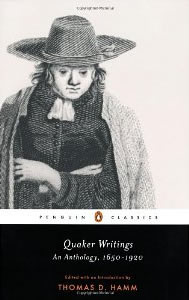Book Notes
 Thomas D. Hamm, editor and introduction, Quaker Writings; An Anthology, 1650-1920 (New York: Penguin Press, 2010), 370pp.
Thomas D. Hamm, editor and introduction, Quaker Writings; An Anthology, 1650-1920 (New York: Penguin Press, 2010), 370pp.
Thomas Hamm, professor of history at Earlham College, has collected three hundred years of primary Quaker sources into an affordable and accessible single volume. A short introduction entitled "The People Called Quakers," which I wish was thirty pages instead of only thirteen, gives a brief overview of the Friends. The fifty selections document all the distinctive features of Quaker history, doctrine, practice, defenders, detractors, and divisions.
The Quakers trace their history to the ordinary laity of England in the 1640s and in particular to the vision of George Foxe (1624-1691). Foxe articulated the ideas of direct revelation to a believer's inner spirit that bore equal authority to Scripture, and that came "without the help of any man, book or writing." This inner light resides in every person, as one detractor fretted: "that all men in the world, have in them a light sufficient to salvation, Turks, Indians, yea, such as never had, or ever shall have any outward means to reveal Christ to them." Then there's the disdain for any outward form, ritual, sacrament, or clerical office (ordination): "being bred at Oxford or Cambridge was not enough to fit and qualify men to be ministers of Christ."
Quakers were famous for their forward thinking about Indians, the mentally ill, prisoners, and especially slaves and women. One of my favorite selections typifies the Quaker distinctive of the full equality and inclusion of women in ministry: Women's Speaking Justified, Proved, and Allowed by the Scriptures by Margaret Fells way back in 1666. John Woolman's influential Journal has never gone out of print since it was first published in 1774. The first person narrative by Levi Coffin provides a deeply moving account of his activities on the Underground Railroad. The last section of the book documents Quaker pacifism back to the year 1661: "All bloody principles and practices, we, as to our own particulars, do utterly deny, with all outward wars and strife and fightings with outward weapons, for any end or under any pretence whatsoever; this is our testimony to the whole world."
Today Quakers enjoy a good reputation, but three hundred years ago their simple life styles, and refusal to pay tithes to the state church or to swear oaths led to severe persecutions as socially disruptive radicals. After reading this wonderful collection I had a sense of gratitude for their unique gospel witness.


